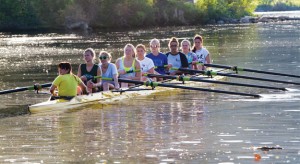The fall season for men’s and women’s crew may be in danger before it even begins.

Both crews knew this year would be tough because of the demolition of Haskill Boathouse, which had been their home since Ithaca College’s crews were created. But now the Bombers are being relocated to Stewart Park to practice on Cayuga Lake instead of the Cayuga Inlet because of a recent water plant infestation.
The relocation has forced the Bombers to share the water with other boat clubs and limited their activities in practice.
Becky and Dan Robinson, head coaches of women’s and men’s crew, respectively, have had their teams run more often since they can’t row in the inlet.
Becky said she replaced some practice time on the water with more dry land exercises and workouts.
“I’ve told them to bring sneakers every day because the day we’re told we can’t row, we’re going to run,” Becky said.
This is the first time this perennial water plant has inhabited waters in New York state. The plant, known as hydrilla verticillata, can grow in almost all aquatic environments, forming dense mats of harmful bacteria when it reaches the surface.
Dan said the presence of the hydrilla plant will have a negative impact on his crew’s preparation.
“It’s like they discovered poison ivy on the football field, and the team has to practice in a hallway to get ready for the game on the weekend,” he said.
Cornell University advised the Bombers’ crews to stop rowing in the inlet Sept. 19 after scientists at Cornell discovered hydrilla buds growing in the water. Rowing in the river could cause the buds from the plant to stick to the underside of the boat as well as the oars, which in turn could spread the plant throughout the inlet.
The crews have been out of the inlet since Sept. 21, when the Robinsons saw a warning issued by the City of Ithaca advising all boaters to refrain from entering. The city has until Oct. 8 to make a decision on whether to use an herbicide to kill the plant.
If the herbicide is sprayed as scheduled, the crews would have to cancel or postpone their fall intercollegiate regattas, which include the Head of the Fish in Saratoga, N.Y., and Head of the Charles in Boston, Mass.
Women’s crew Graduate Assistant Coach Anthea Barnett said the regattas were the only time during the fall season that the freshmen could get to row in the competitive atmosphere of a regatta.
Becky said the makeshift site resembled a pre-race atmosphere on the road.
“I feel like we’re in a regatta because that’s what people there do,” she said. “They just store the boats outside in exactly the same fashion as we have them, and I go down there and feel the same excitement as if it were race day.”
Becky also said she was impressed with her crew’s ability to adjust to the unusual circumstances.
“They’ve had really good attitudes about it and treated it more as an adventure than as a hardship,” she said.
Senior Bianca Lupi, who is competing in her second season on women’s crew, said the environment on the lake was choppier than rowing on the inlet.
“It’s a shakier experience, and we’re not really protected from the wind, so conditions are always a little rougher,” she said.
The crews also had to make adjustments to a temporary storage facility, as Haskell Boathouse was demolished Sept. 19 to make room for construction of a new boathouse, which will be completed in time for the fall 2012 season.
Barnett said she has fond memories of being incorporated into the team at the old boathouse.
“It’s where you learn to row, and where you become a member of the crew family,” she said. “That’s where you have your boathouse cookouts every weekend over the summer, and you throw people in the water every year on their birthday.”
The temporary boathouse has a fenced area less than 10 yards away from active freight railroad tracks. Boats and oars sit on racks neatly stacked on top of each other. In the sole tent, there are wooden benches, supplies, and tools covering a long, narrow table. There are two port-a-potties, and valuables such as cellphones and student ID cards are sometimes left out in the open. The docks and ramps have been moved more than 100 yards from the former site of the Haskell Boathouse to the current setup.
Dan said his crew was uneasy with the setup at first. He said the day after men’s crew started practicing at the new site, it found some of its valuables had been pulled out of the area.
The men’s crew coaching staff has locked away valuable tools in a nearby shed and the crew ensures that the gates enclosing the area are locked after every afternoon practice.
But the crews will establish a permanent home soon enough. Barnett said the new Ward Romer Boathouse, which has been a year and a half in the making, includes new upgrades that the Haskell Boathouse did not have. It will be two stories high and have enough room for three full racks of boats side by side.
Becky said the stress stemming from lack of a permanent boathouse will be worth the time her team will spend in the new facility.
“A year without being in a boathouse is worth the fifty years of being in one,” she said.







